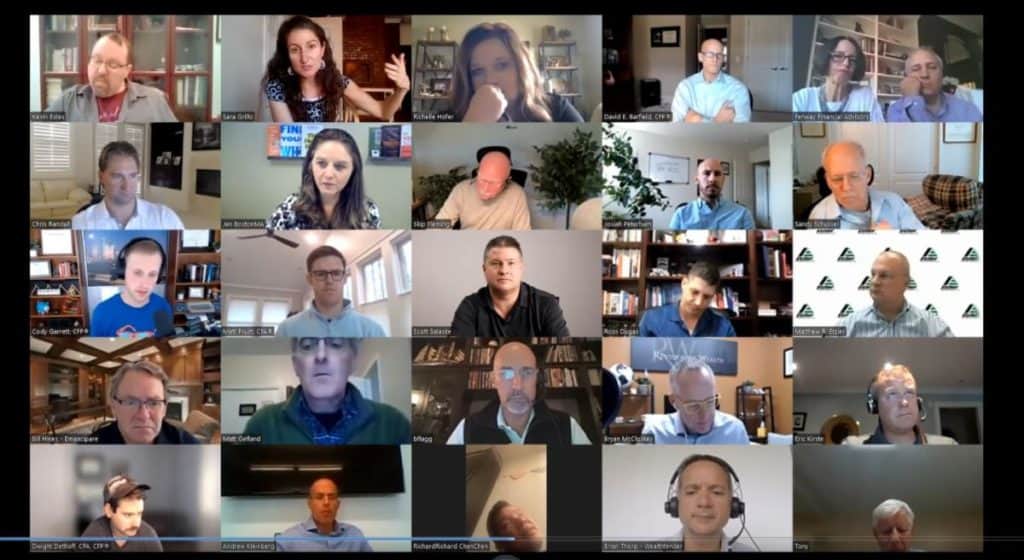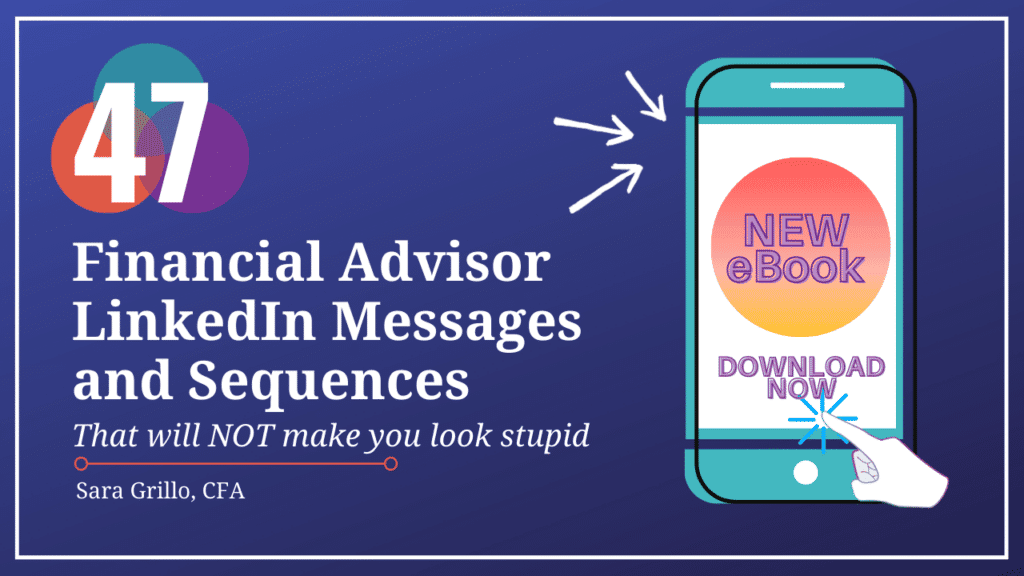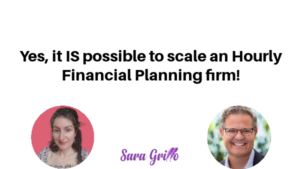Podcast: Play in new window | Download
This debate went psycho at times. Watch as all h&#@ breaks loose discussing the question of broker vs. financial advisor, commissions, fees, value, and more! This discussion was not censored – but maybe it should have been.
We talked about:
- What is the best, fairest fee model for the client?
- Do conflicts of interest matter as long as they are disclosed?
- Are low fees better than high fees?
- Does the way you are paid dictate how you serve clients?
- Does the AUM fee model represent a conflict of interest that needs to be disclosed?
- Should advisors be required to disclose fees in dollars each year and/or each time a product is sold?
- Are clients capable of determining when your fees are too high or should there be some other standard that fees are measured against (e.g. hourly rate, industry benchmarks, etc)?
- What obligation do advisors have, if any, to explain to clients the different fee models available to them?
- In the absence of a securities account, what value do you provide to your clients?
The debaters are:
And me! For those of you who are new to my blog, my name is Sara. I am a CFA® charterholder and financial advisor marketing consultant. I have a newsletter in which I talk about financial advisor lead generation topics which is best described as “fun and irreverent.”

Does it matter that clients know the fees they are paying?
In this clip we debate whether or not it’s important that the client knows what fees they are paying. And, if so, what fees are included in the definition of “all the fees.” Is it just the fees that are directly debited out of an account, or is the cost of a product (such as an insurance product) relevant? Is that a fee? Should brokers disclose that cost even though it’s not technically classified as an outright “fee”?
What do you think? Is it important that the clients know all the fees or just some of them? If the fee isn’t coming out of the account directly (but rather embedded in a contract) is it still relevant to the cost discussion?
Do RIA firms give away the hard stuff for free?
A critical question in the debate of financial advisor vs. broker is what is value? What is the value of the services provided, and how is this determined? This can get complicated when services are bundled and provided for one inclusive fee, which in certain cases (AUM advisors) is calculated off the amount of assets the advisor is managing.
It’s an important question because how you are compensated determines your motivation for what you do. If your fee isn’t tied directly to a particular aspect of service, you may be less inclined to do a great job because there is less of an incentive. Theoretically a financial advisor or broker should do the best work no matter how they are paid – but in reality time is a resource and how it’s allocated does tend to go in the direction of where you are earning.
Do you agree? Or are we being too tough here?
Should clients be the ones to judge if they got a good deal?
In this clip, financial advisors debate against brokers about whether or not it matters that the client knows the fees they are paying, so that they are able to judge whether or not the service is worth it. Some may feel that the broker or advisor should be the one to make that decision. Others feel that is too subjective a decision and that the client should be given the full information that way they are informed enough to judge for themselves.
Does a service become more valuable just because the fee is disclosed? If not, then why is it necessary to do so? The advisors hashed it out vs. the brokers on that one.
Here it was also debated if the value of any service can be assessed when the outcome is not guaranteed. The advisor vs. broker repartee became very pronounced here as the advisors felt that value didn’t depend on outcome, whereas the brokers felt that the outcome must be guaranteed in order to claim you are providing value.
Other notable points in this debate:
5:01
The agents made the point that it’s strange to see clients losing money to fees and also losing money to the market.
5:05
“Do you think it would be important that the client understand how much fees they are paying?” – Matt Pruitt
7:55
The advisors made the point that the cost of insurance can’t be separated from the “cost of service” or the commission the agent makes.
11:10 The point was made that even though AUM fees and flat fees are more transparent than commissions, it doesn’t mean that the advisor did a great job for the client.
Here’s where the debate hit on a critical topic, which is the question of value. The agents said that without knowing the outcome upfront, it’s impossible to know if the advisor provided value. The advisors said that is not true, and that many times even with an insurance product you don’t know what the outcome will be.
9:37
“Does the customer, before that paper is pushed over to them, accept that they got a good deal?” – Mike Pankans
At 11:51, Chris Randall had a great quote. He said, “The fairest fee model is one that clearly describes the price the client is going to pay and what services are included in that price. Insurance does not include the price that the client pays for the service. It is…jumbled up with all the other costs of the product.”
The agents then came back with the rebuttal that if the agent believes that the client got a good deal, then they got a good deal. The agents say that they shop the policy to make sure the client gets a good deal.
13:50
The agents said that whether they are making $5k or $50k commission, it’s irrelevant if agent is doing the right thing.
15:05
“It comes down to the client’s needs, what the strategy is going to provide for the client, and then we look at how we can efficiently affect how those costs hit that client in their portfolio.” – Charles King
16:44 There was a question of how a retainer or ongoing fee disincentivizes the advisor from fighting to provide value.
19:59
“Everybody should be compensated for the service they provide, and that compensation should be clearly stated at the bottom of the statement that the client can point to and say, “This is what I’m paying for the service.” – Chris Randall
23:54
“Clients are coming to advisors because…the vast majority don’t understand some of these things to the extent they need and that is why they are seeking the help of an advisor. So when the advisor is not totally transparent with what their fee model is, not just the fees they are charging but any fees and costs overall, whether it is insurance products, whether it’s AUM fees, whether it’s fixed fees or hourly fees or a combination of all these…” – Scott Salaske
30:04
“Just because you can put numbers on a piece of paper, doesn’t mean you’re providing value.” -Doug Twiddy
36:13
“What they’re saying is, we’re going to provide comprehensive financial advice on your investments, but also on your tax, on your estate planning, on your retirement, on your budget, , on your net worth, on risk management, on this, that and the other, and you’re going to pay me a small fee out of your investment accounts that covers all this…in other words.. pay me for investments, for the easy work that I can outsource to a third party manager, and I’ll give you all this hard stuff for free…I don’t believe that., I really don’t.” – Derek Robinett
41:09
“If the insurance is an appropriate product because they need insurance of any kind, whatever it happens to be, the question becomes, if you don’t know what you’re getting paid on it, then how does the client know that this is the right policy for them?” – Scott Salaske
44:19
“If you’re going out for 20 year term, who cares what the commission is? The commission is the commission. Who cares? I can go out and buy a Mercedes. I don’t care what that sales rep is making. I really don’t. As long as I feel I got a good deal.” – Michael Pinkans
59:01
“Derek, I’m telling you, my mom who is a widow…would have no [explicit] idea how to do that [to move the decimal point two places].” – Matt Pruitt
Sara’s upshot – is it better to work with a broker or a financial advisor?
What’d ya think of my debate on broker vs. financial advisor? Was this helpful?
If yes…
Join the Transparency Advisor Movement.

The Transparent Advisor Movement’s mission is to promote ideals of clarity, modesty, integrity, dignity, and client advocacy in all aspects of financial advice, with a special focus on Advice Only, Flat Fee, and Hourly service models. There is a special emphasis on clear disclosure of services and their related fees.
The Transparency Movement is the future of the industry – we welcome anyone who believes in our values to join us.
Join our next Transparent Advisor virtual meetup.

These meetups are free and the goal is to learn from each other about how to grow and manage a transparent practice for the benefit of clients.
Even if you can not make the meetup, or even attend in its entirety, please register for the replay and to be notified of the next one.
For marketing tips in the transparency age…
Learn what to say to prospects on social media messenger apps without sounding like a washing machine salesperson. This e-book contains 47 financial advisor LinkedIn messages, sequences, and scripts, and they are all two sentences or less.

You could also consider my financial advisor social media membership which teaches financial advisors how to get new clients and leads from LinkedIn.

Thanks for reading. I hope you’ll at least join my weekly newsletter about financial advisor lead generation.
See you in the next one!
-Sara G
Participant Bios
Michael Pinkans
With over thirty years of financial services experience, Mike is an independent financial professional helping individuals and small business owners in providing unbiased insurance and investment strategies. I also partner with E4 Insurance Services, a full-service brokerage agency to help noninsurance-oriented professionals (CFP’s, CFA’s, investment advisors, etc.) provide protection solutions for their clients.
Prior to entering the financial services industry, Mike received a 4-year Air Force ROTC scholarship and attended Union College in Schenectady, NY earning a B.S. degree in Computer Science. On active duty at Headquarters, Strategic Air Command (SAC), Offutt AFB, Omaha, Nebraska from 1984-1988, he obtained the rank of Captain and earned his MBA from the University of Nebraska-Lincoln.
Later, he earned his Master of Science in Financial Services (MSFS) and Master of Science of Management (MSM) degrees from The American College. A student of the industry, he also has the following designations: the Fellow, Life Management Institute (FLMI), the Chartered Life Underwriter (CLU), the Chartered Financial Consultant (ChFC), the Certified Financial Planner (CFP), and the Chartered Financial Analyst (CFA). He holds multiple FINRA licenses and he is associated with The Leaders Group, and independent broker-dealer.
Matt Pruitt, CFP®, CFA®
Matt has over 10 years of investment experience, including a highly technical background in private equity backed transactions and corporate debt restructurings. Matt founded Exhale Wealth Management to provide comprehensive financial planning to individuals with complex lives, most notably technology employees with equity compensation. Matt holds the CFP® and CFA® designations and lives in Minneapolis, MN with his wife and two young girls.
Chris Randall
Chris Randall is the Founder & CEO of Axis Capital Management. He launched the firm in January of 2022 after realizing that there were no financial advisors available for people that don’t have millions of dollars of investments. His goal is to elevate the investment education of millennials and first time investors, so they can grow their wealth and achieve financial independence. Prior to founding Axis Capital, Chris was a Fixed Income Trader at Guggenheim Partners, focusing on municipal bonds and asset-backed securities. He spent 10 years there managing billions in assets for institutional and retail clients. Prior to joining Guggenheim he spent 5 years at Capital Group Companies as a trader in the fixed income division.
Derek Robinett
Derek Robinett is a well-educated, experienced financial executive. As a CPA, he has been preparing complex tax returns for high net-worth individuals and businesses for over ten years. As a CFA (Chartered Financial Analyst), he is proficient in creating and managing portfolios. And, as a PFS (Personal Financial Specialist), he is able to integrate his knowledge of investments and tax into your personal financial situation to help you reach your financial goals.
Derek was raised in DeLeon, Texas and spent five years as a cryptologic technician in the Marine Corps. In 2010, he moved to Midland where he currently resides with his wife, Heather, who teaches at Midland ISD. They have two children, Emily and Ryan. Together, they enjoy music, theater, musical theater, traveling and cooking on the patio.
Scott Salaske
Scott Salaske is the founder and CEO of Firstmetric, a flat fee financial advisor firm in Troy, Michigan. Ever since the beginning of his 20+ year long career, Scott has pursued his mission of delivering high quality financial advice in a low cost and unbiased way.
Early on in his entrepreneurial journey, Scott saw firsthand the inherent flaws and conflicts of interest in the traditional sales and product driven approach, as several family members had lost a significant portion of their hard-earned life savings to high-cost, commission-based investment products and inappropriate advice.
It was at that point Scott thought there had to be a better way for investors to obtain unbiased advice and low-cost access to the financial markets. That lead him to start Quest Asset Management, with the novel idea of putting investor interests first as a fiduciary, which was practically unheard of at the time. The idea centered on the concepts of simplicity, keeping total investment costs and taxes extremely low and developing a custom investment plan for each client using low-cost asset class and index funds.
A few years later Scott merged Quest with another local investment advisory firm, Portfolio Solutions, that shared the same investment principles at that time. Several years after the combined merger, Scott went on to grow the combined firm from advising approximately $60 million in client investment assets under management to more than $1.4 billion. In early 2015, Scott sold his ownership interest in the firm. He started Firstmetric a few years later.
At Firstmetric, Scott continues his mission of delivering low cost, unbiased advice to clients. Along his journey he has been quoted in the following publications: The Wall Street Journal, Investor’s Business Daily, Kiplinger’s Retirement Report, TheStreet.com, Cheddar.TV, Crain’s Detroit Business and MarketWatch.com; among others.
Charles King
Charles King is a financial advisor licensed in 55 states and territories. Writer, former Tactical Team leader and search and rescue operator for the USCG, started at Merrill Lynch, VP 3 times over, Independent oil and gas and land deal wildcatter, former interim CIO, financial advisor, advocate for his clients, strives to achieve his core values of honor, respect and devotion to duty every day.
Doug Twiddy
Doug Twiddy has spent 15-years assisting financial planners and wealth advisors with guidance on proper planning strategies for their clients. As an expert on annuities, advisors rely on his knowledge for recommending the correct product or financial strategy based on the varying needs of their clients. Many times, this results in a custom layering of products to maximize their clients value and nudge ahead of the competition. Doug truly enjoys strategy planning sessions with advisors to find the perfect outcome for each client.
Annuities typically revolve around the retirement and decumulation stage of life. This is also the time that Social Security plays a major role in someone’s life. Doug has traveled all over his home state of Virginia to host Social Security workshops for advisors. He can help maneuver the difficult waters of claiming Social Security at the appropriate age, the impact of taxes based on provisional income, and the impact of fund values in different retirement buckets. Many clients also have a pension they need to determine how to claim. Doug built a Pension Maximization Analyzer which will take other income, Social Security benefits, and taxes into consideration and prepare an 18-page presentation on which option to choose and why. Advisors are always grateful for the assistance of pulling all the pieces together of maximizing retirement income.
Understanding the best way to balance a client’s needs like maximizing net retirement income, proper wealth transfer, and protection of assets from Long-Term Care (LTC) concerns is just part of his work.
While he does not consider himself a salesperson, he does enjoy conference calls with an advisor and their clients to help explain the features and values of certain products being recommended. Doug will bring confidence, product knowledge, and a good connection to the call so you can focus on carrying your client through the phases of retirement as you intended.
Disclosures
Transcript may deviate from what was originally said in discussion.
Grillo Investment Management, LLC does not guarantee any specific level of performance, the success of any strategy that Grillo Investment Management, LLC may use or mention in any of its content, or the success of any program it may mention in any of its content. Grillo Investment Management, LLC will strive to maintain current information however it may become out of date. Grillo Investment Management, LLC is under no obligation to advise users of subsequent changes to statements or information contained herein. This information is general in nature; for specific advice applicable to your current situation please contact a consultant or advisor. I want to be clear that nothing in this podcast or blog can be interpreted as an investment recommendation of any type. The opinions expressed herein do not necessarily represent the views of Sara Grillo or Grillo Investment Management, LLC. Also, nothing in this podcast or blog can be interpreted as legal or compliance advice. For advise on such matters, contact a legal or compliance advisor. Any similarities to persons deceased or alive are entirely coincidental.







